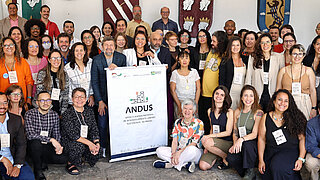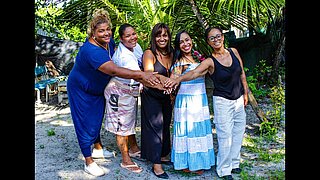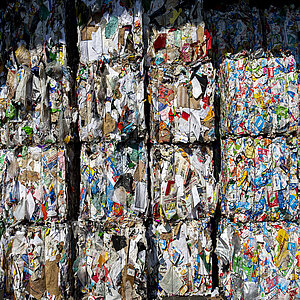The city is the solution

How urban centres in Brazil are showing us the way towards climate change mitigation.
Have you ever looked at a city in Latin America and thought that this could be the solution to our societies’ challenges? Probably not.
We are used to looking at cities, especially in the Global South, as problematic spaces with too much traffic, insufficient urban services, poverty and high inequality and a lack of public safety. But cities have the potential to be so much more. The IKI Project ‘Support to the National Agenda for Sustainable Urban Development in Brazil (ANDUS)’ set out to identify and realise these urban opportunities for the fight against climate change.
Understanding urban realities
At an event presenting the results of the project, the mayor of the small city of Amajari in the northern Brazilian state of Roraima, Nubia Lima, put it perfectly, saying that their city and their realities had finally become visible. At long last, the national urban policies have recognised that there is more to Brazil than São Paulo and Rio de Janeiro and are looking for localised answers. She added that, during the project, the female-headed team from Amajari had participated in a mentoring and peer-learning programme on nature-based solutions and land regularisation for cities. With the support of the IKI-project, it had implemented the first system for wastewater treatment and drainage management. The team then shared its experience with the other 15 municipalities of the state in the Amazonian region, and Roraima became a reference for other small and medium-sized cities in the North of the country, where public funding is lacking, and local capacities are low.
Individual solutions and stand-alone projects are important, but not sufficient to make a difference in a country as large and diverse as Brazil, so it was essential to build a bridge to national policies and tools. During the course of the project, for the first time guidelines and concrete suggestions on how to improve climate adaptation and mitigation were included in the national handbook on Master and Strategic Urban Plans (Plano Diretor), which the Ministry of Cities provides to all Brazilian municipalities. The Plano Diretor is the main tool for cities to define their land use, identify and prepare strategic projects and orientate the public annual budget.
The cities of Rio de Janeiro and Sobral (in the northeastern State of Ceará) immediately applied the newly developed methodology to facilitate the participatory planning process for revising their Plano Diretor. The revised version includes new objectives on fighting climate change, such as a low-emission neighbourhood in the city centre of Rio de Janeiro.
Influencing national policies
Dialogue between the national, state and local governments is key to developing successful urban climate policies in Brazil. The countries government is structured as a federal governance system providing cities the autonomy of formulating their own laws, raising their own taxes and designing their urban policies. Although cities enjoy having this autonomy, which gives them the ability to respond to their own local realities, the project implementation showed the importance of clear guidance from the national level, especially on upcoming topics such as climate change and digital transformation. The key to preparing agendas, programmes and policies at national level that make sense lies in the design of the process. Therefore, the ANDUS project did not only achieve to include climate change goals in the National Urban Development Policy and the Brazilian Smart City Charter but managed to innovate the processes how such policies are formulated.
In two large national processes, more than 1500 representatives from over 200 municipalities, academic institutions, the private sector, the national and state government and civil society participated in digital and analogue collective agenda setting formats. The result was the Brazilian Sustainable Urban Development Goals, three of which explicitly target climate change. In a next step, these goals will be translated into a new national law on urban development.
Promoting collaboration
The Ministry of Cities and the IKI project, together with the Brazilian Association of Mayors (Frente Nacional de Prefeitos) and the Alliance of various Brazilian social foundations, then continued developing the results from this experience to form the National Network for Sustainable Urban Development (ReDUS). ReDUS offers an online platform for organisations and individuals to design and participate in different collaborative processes that promote more sustainability in cities.
This platform became a particularly important tool for municipalities to learn about and promote their climate agenda since, over the last four years, other support mechanisms by the national governments, especially from the Ministry of the Environment, were stopped due to differing political priorities. People and institutions from all 27 states, from 335 cities and 1097 organisations already contribute to the ReDUS platform.
The approach of the ANDUS project focused on facilitating collaboration and learning regarding how to promote urban climate protection among cities and between the national and the local governments, since sustainable urban development is a collective responsibility and suitable solutions on the ground can only be found by the people on the ground.
The link has been copied to the clipboard
Contact
IKI Office
Zukunft – Umwelt – Gesellschaft (ZUG) gGmbH
Stresemannstraße 69-71
10963 Berlin
IKI Brown Bag Lunch
The IKI project ANDUS presented its project work at an IKI Brown Bag Lunch.




![[Translate to English:] Thumbnail Video A cidade é a solução](/fileadmin/_processed_/d/f/csm_20230209_A_cidade_e_a_solucao_Thumb_29ff34abc4.jpg)





